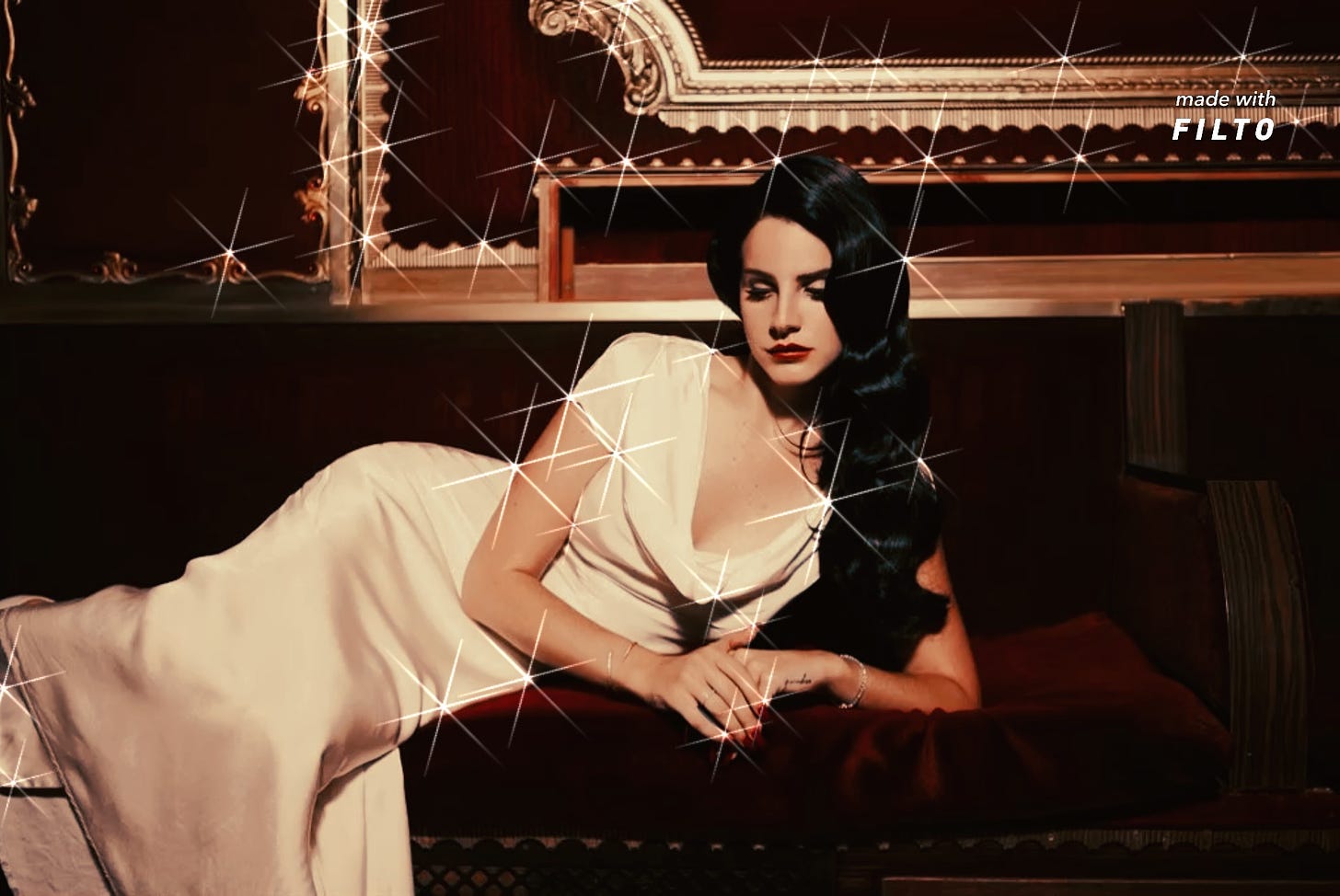With J.D. Vance selected for the Trump admin, it’s apparent that MAGA has a new type of company infiltrating its ranks. Vance, with Peter Thiel’s support, represents what Richard Hanania has dubbed the “Tech Right.” Alongside Elon Musk, these types find themselves involved in a regime change within the conservative movement, which is in part an expression of their interest in escaping modernity. However, those aren’t the only figures that flirt with these meta-political, quasi-philosophical ideations—Lana Del Rey also finds herself in this new gray area.
Citing the activities of Musk got her plenty of scorn from fans and critics alike. And in her infamous Fader interview, she expressed that feminism was “not interesting enough” for her personally. Instead, she mentioned space exploration and technological innovations having a better pull for her at the time. We might expect a similar response from Kerouac and Burroughs.
Lana’s statement wasn’t even that scandalous in the grand scheme of things. Rather, it should incite us to ask ourselves whether feminism is still capable of meeting the needs of today’s young women—who over time seem to be more vocal about the spiritual and aesthetic nature of their needs…and ultimately if such fatigue with feminism was inevitable. If anything, her statement—more like her whimsical musing—sheds light on the new shift toward the Tech Right.
The celebrity and her fans ultimately defined themselves as what Rachel Haywire called “Philosophy Queens.” They don’t read Gloria Steinham’’s talking points in New York Magazine. They don’t want to sit and watch a feminist explain her understanding of Simone De Beauvoir. Their revolutionary side has more aesthetic than political appeal. It was the journey into the American underworld of beatniks and esoteric music that galvanized the philosopher queens of the 20th century. Del Rey was no exception when she used everything to drive young people out of the climate from the Golden Age of Hollywood throwbacks to Kerouac’s Americana themes. These were escapes from politics. It’s post-political. Much like for Thiel, it was like “an escape from politics in all its forms.”
There are traces of liberalism left in her identity, however. The most incriminating examples include an album that came out during an election year…as well as the hex she placed on Trump via Twitter. We also need to situate her within the context of Tumblr girls in the wake of the paradigm shift of 2016. Before the election, there were few people trying to understand the psyche of these teens that spent so much time posting anonymously about who knows what. As
emphasized, the merging of fantasy and anonymity allowed women to adopt selective identities without their parent’s influence. This manifested into political and sexual personifications not unlike the beatniks who didn’t have gatekeepers preventing people from looking to other heroes to define the movement.Del Rey’s merging of romanticism and “Hollywood Sad Core” reached the public at an opportune time given the climate. However, she couldn’t shy away entirely from the political context that her fans were surrounded by. Like Robert Sean Leonard in Swing Kids, the beauty of the scene has a mostly musical and theatrical quality, though it does get interrupted by politics–an unfortunate pattern Del Rey and Thiel have tried to counter.
It’s also worth reminding people that Musk may be more invested in a transhumanist project rather than the dazzled dreams of Del Rey. Her romantic celebration of regional identity implies that we come from somewhere like Daisen. It can’t be rooted in utopian thinking beyond biology. Otherwise, we find ourselves trapped in the materialist thinking of partisans. It’s concerning that figures like Musk and Thiel find themselves in political company, a situation that could divert them from the political intent of their projects. Whether they realize it or not, the task of managing the balance between the preservation of authentic, rooted identity and the bent toward a dystopian technologization of the real, is in their hands.
Musk seems occupied with personal projects as well as Twitter (oh yeah, X), which has become a vague libertarian pitch for free speech and not letting woke-ism determine elections. A noble gesture. Yet, Thiel also seems to have more political cache with his guy Vance capturing a VP spot. That situates both of them as political juggernauts for the next few months. If that’s the extent of their legacy, it’s far from looking for young talent outside the leadership institute. In order to do well by the Philosopher Queens, this political stuff limits the imaginations of would-be shapers of history. We could find savvy eloquent speakers that explain American decline at NatCon. What Thiel and Musk provide goes beyond the Republican Party. They could create trends and liberate the youth from politics, as Theil mentioned when he shed his libertarianism.
Rather than stick by that, they need to shed their conservatism and find authentic identity outside the media hype of November. X would be better used to galvanize groups to replace the neocons, mobilize people outside the fringes, and influence the Overton Window. Those groups could go offline and bring social capital back to a generation that needs it. All of this done outside the purview of CPAC and Trump rallies. A renaissance of socialization escaping the boring political spectrum.
Lana is interesting precisely because she is apolitical. Her aesthetic—rooted in her dreamy escape into a realm beyond this (rather boring, reductive) one—resists being co-opted by those with political agendas. Such metaphysical musings speak to the yearnings of today’s youth in a way that politics doesn’t—and ontologically just can’t.
The Tech Right at one moment will allude to the escape from politics with their projects representing innovations in a century that lacks social capital. Yet at other moments, they act as gatekeepers of a political project that leave us no better off than the conventional conservative ones would. Del Rey has already accomplished Theil and Musk’s goal of planting the seeds to escape modernity and its consequences among the youth They’d do well to learn from Lana, whose dreams of electric sheep are capable of taking us further than any technological innovations—or the politics surrounding them—ever could.





